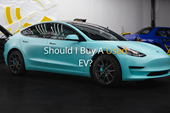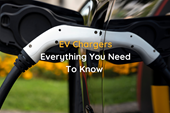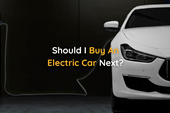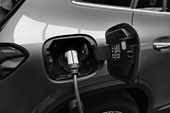
Should I Trade My Petrol Car For An EV?
Quick Links
Is Switching To An EV Right For You? Let’s Find Out
1 Minute Read: Should You Switch to an Electric Vehicle?
With nearly one in five new UK cars now electric and a 2035 ban on new petrol and diesel models looming, many drivers are wondering if it’s time to make the switch. Electric vehicles (EVs) offer lower running costs, fewer moving parts, and a significantly smaller carbon footprint, often up to 70% less CO₂ over their lifetime. Financial perks like zero road tax (until 2025), reduced company car tax, and exemption from congestion charges make EVs especially attractive for city drivers.
However, EV ownership still isn’t perfect for everyone. Higher upfront prices, charging access, and range limitations can make them less practical for drivers without off-street parking or those who frequently travel long distances. Depreciation can also be unpredictable as battery tech evolves quickly.
If you’re not quite ready to go fully electric, plug-in hybrids offer a smart middle ground, combining short-range electric driving with petrol backup for flexibility and peace of mind.
Bottom line: Switching to an EV makes sense if you value low running costs, sustainability, and drive mostly short routes with easy access to charging. But if convenience and cost still favour petrol, waiting a little longer is no bad thing. The future is electric, but the timing should be yours.
Introduction
If you’ve been wondering whether to trade your petrol car for an electric vehicle (EV), you’re not alone.
The UK is steadily moving towards an all-electric future, with sales growing every year since 2010, accounting for 19.6% of all car sales in 2024. With new petrol and diesel cars due to be banned by 2035, the shift seems to be going only one way.
But is now the right time to make the switch, or is it better to wait a little longer? The answer depends on your lifestyle, driving habits, and priorities.
Before we take a look, though, let’s cover some of the basics.
What Is The New ‘Pay Per Mile’ Tax For Electric Vehicles?
The BBC and many newspapers are reporting rumours that Rachel Reeves, the current Labour chancellor, is considering implementing a ‘pay per mile’ tax on electric vehicles, aimed at reducing the deficit from money lost in fuel duty (which EVs don’t pay).
Whilst there clearly needs to be some other way to raise funds through motoring, especially as fuel duty decreases (with the reduction in petrol and diesel cars), the move has been seen as a ‘kick in the teeth’ for UK EV drivers, especially those who feel unfairly charged after making the switch to a more sustainable car.
Others in the industry suggest the implementation of a pay per mile tax could stifle the demand for EVs, effectively pausing the momentum they have had in recent years.
As of November 2025, there’s no pay per mile tax in place; however, this may change after the next budget announcement.
Should I Worry About Electric Car Charging Stations?
‘Charging anxiety’; the worry that you’ll not have enough charge or battery range to get to your destination has been, and still is, one of the biggest issues facing would-be EV drivers.
With an increased charging infrastructure, these worries have subsided, with X EV drivers saying they wouldn’t go back to a regular fossil fuel car.
In the UK, there are currently 86,021 public charging devices installed. In addition, the government is aiming for a total of 300,000 public charge-points by 2030. So there’s less and less need to worry about finding a charging station or running out of power on longer journeys.
Read More: EV Chargers | Everything You Need To Know.
Should I Trade My Petrol Car For An EV?
Why Drivers Are Switching to EVs
There’s no denying that electric cars have come a long way in a short time.
Once a niche option for the eco-conscious, they’re now firmly part of the mainstream, accounting for around one in five new cars sold in 2024.
But what’s driving that momentum?
Read More: Time to trade? If you’re current car is financed using PCP, take a look at our guide: Steps To Take Before The End Of Your PCP Agreement.
Lower Running Costs
Charging an electric car is generally cheaper than filling up a petrol tank, particularly if you can charge at home. The Energy Saving Trust estimates that running an EV costs around 3p–10p per mile, compared to 15p–20p per mile for a petrol car.
Add in lower maintenance costs (no oil changes, no clutch, fewer moving parts) and the long-term savings can really stack up.
Environmental Benefits
If you’re trying to reduce your carbon footprint, EVs are a clear winner. Even after factoring in battery production, electric cars produce up to 70% less CO₂ over their lifetime compared to petrol equivalents, based on data from the European Energy Agency.
And as more of the UK’s electricity comes from renewable sources, the environmental benefits will only grow.
Tax & Incentive Perks
Right now, EVs come with several financial perks:
- No road tax until 2025 (Gov.uk)
- Low Benefit-in-Kind tax for company car drivers (currently 2%)
- Exemption from London’s Congestion Charge and many local Clean Air Zones
If you use your car for work or commute into cities, these perks alone could make a big difference.
When It Might Be Better to Wait
Of course, switching to electric isn’t the perfect move for everyone, at least not yet.
Higher Upfront Costs
EVs are still more expensive to buy than petrol cars. The Auto Trader Electric Cost Report found that the average new EV costs £8,000 more than a similar petrol model.
Although running costs are lower, it can take years to balance out that initial expense, especially if you don’t cover many miles annually.
Charging Access and Range
As we’ve already discussed, the UK now has well over 80,000 public charging points (Zapmap), but access still varies depending on where you live. If you don’t have off-street parking or travel long distances frequently, charging can be inconvenient.
And while most new EVs now offer between 200–300 miles of range, it still doesn’t quite match the convenience of a petrol fill-up that takes five minutes.
Depreciation Concerns
Electric cars are relatively new to the market, so resale values can fluctuate more than petrol vehicles. Some models depreciate faster, especially as battery technology improves rapidly and new, cheaper EVs enter the market.
We’ve covered some of the best-selling EVs in more detail in our study; How Much Do Electric Vehicles Depreciate?
If you’re concerned about depreciation, consider Gap Insurance, which pays the difference between your insurance settlement figure and the amount you paid or still owe.
A Sensible Middle Ground: Hybrid Cars
If you’re curious about EVs but not ready to commit, a hybrid car might be the answer. Plug-in hybrids (PHEVs) allow you to drive shorter distances on electric power, then switch seamlessly to petrol for longer trips.
RAC research suggests PHEVs can improve fuel economy by up to 30% and offer a useful bridge between traditional and electric driving.
When It Makes Sense to Switch
You might be ready to trade your petrol car for an EV if:
- You have home charging access (like a driveway or garage)
- You mainly drive short daily commutes
- You plan to keep your next car for several years
- You live near or within a Clean Air Zone or Ultra Low Emission Zone
Our Final Word
Trading your petrol car for an EV isn’t just about following a trend; it’s about whether the technology fits your life.
If you want lower running costs, a quieter drive, and a smaller environmental footprint, switching now could make perfect sense. But if you rely on long-distance travel or lack easy charging access, keeping your petrol car a bit longer is still a practical choice.
The key is to make a decision based on your needs, not just the market buzz. EVs are here to stay, and whether you switch now or in a few years, being informed means you’ll make the right move when the time comes.
Pin It!













